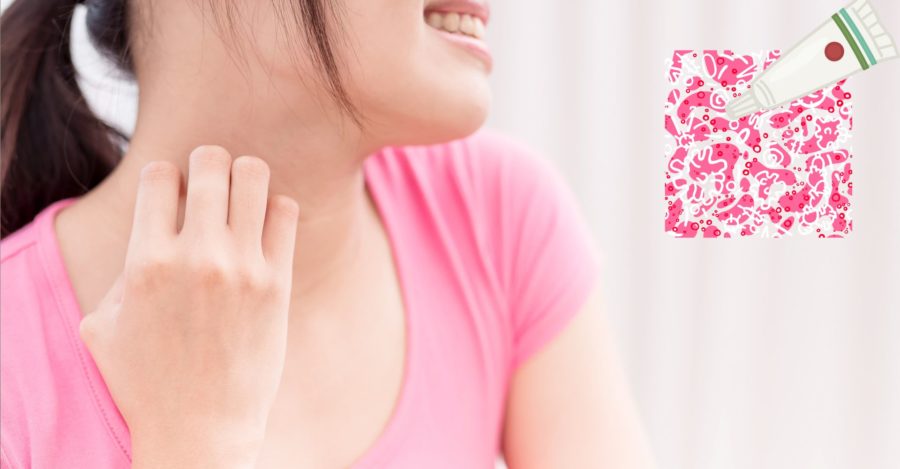In the USA alone there is a whopping 31.6million people who suffer with some form of Eczema.1 With approximately 1 in 10 people developing this condition during their lifetime awareness of early signs and symptoms is very important. It’s always a good idea to schedule an appointment. To view the latest research and symptoms try an online search.
So What Exactly Is Eczema?
Eczema is an inflammatory skin condition that causes rashes, dry skin, itchiness, infections, blisters or scaly skin. Eczema has another name in medical professionals called dermatitis. There are many factors which can lead into the development of Eczema and with many different types its important to be aware of early symptoms. Recent statistics in the USA show that about 80% of contact dermatitis is irritant based and about 20% is allergic.2
What Types Of Eczema Are There?
Currently Eczema is split into 7 different types of conditions which include:
- Atopic Dermatitis – This is the most common form of eczema and usually begins in childhood. This condition is usually coupled with asthma and hay fever which is considered to be an allergenic response of some sort.
- Contact Dermatitis – Most noticeably if you have red, scaly and irritated skin it is most likely contact dermatitis. This is generally caused by a reaction of a substance you have touched or put on your skin.
- Dyshidrotic Eczema – This type of eczema affects woman more than men and causes small blisters to form on hands and feet.
- Hand Eczema – As the name suggests this affects the hands and is common to those who use a lot of chemicals on their hands or as a byproduct of their job such as hairdressing or cleaning.
- Neurodermatitis – Similar to Atopic Dermatitis this causes thick scaly patches to form on your skin which are incredibly irritating and itchy.
- Nummular Eczema – Nummular means coin in Latin and is used to name this condition as it causes coin shaped spots to form on your skin.
- Stasis Dermatitis – This condition is caused by weakened veins that leak fluid into your skin. This fluid can cause swelling, red patches, pain and itching.
Who Is Most At Risk Of Developing Eczema?
Eczema is a condition that can affects nearly everyone at some stage in their life however it is mostly brought about in childhood. 90% of eczema cases start in children younger than 5 years old.3 Approximately 60% of infants who have eczema continue to have repetitive bouts of this condition as they enter adulthood. Other factors include family history with those whose parents suffer from the condition are more likely to develop it too.
The Early Warning Signs And Symptoms Of Eczema
It is important to understand that the symptoms of eczema are different for everyone however it almost always includes some form of itchy, irritated skin. The most common symptoms include:
- Excessively Dry and Sensitive Skin
- Itchy Skin
- Inflamed or Reddened Skin
- Oozing or Crusting Sores
- Areas of Swelling or Pain
- Rough, Leathery or Scaly Skin
What Treatments Are Available For Eczema?
Now it is important to note there is no immediate cure for eczema but there are treatments available to remedy this condition. Depending on your age and severity of your eczema condition will determine the appropriate form of treatment. Such treatments include:
- Medical Grade Moisturizing Creams.
- Corticosteroid Creams and Ointments
- Systemic Immunomodulators
- Phototherapy (UV Light therapy)
- PUVA Therapy
Tips For Managing Eczema At Home
If you’re suffering from eczema there are multiple ways you can help to manage this condition from your own home. Many times people accelerate the condition of eczema by irritating the skin so its important to note the best ways to keep the condition from flaring up.
- Appropriate Skin Care – Make sure the skincare routine you’re following does not contain harsh ingredients or allergies to your skin. Applying natural based products is very important and things like tea tree oil, rose hip oil or coconut oil can be relieving.
- Bathe In Warm Water – Do not bathe or shower in excessively hot water which may cause further irritation to the skin. Avoid excessive bathing too, keep showers or baths to once a day to stop further drying of the skin.
- Ease Stress – Try to keep stress to a minimum which can cause further eczema breakouts.
- Avoid Common Triggers – Such things like pollen, dust and mold may cause the condition to flare.
- Organic Clothing – It may seem excessive but choosing organic clothing made from organic wool or cotton can dramatically help the skin to breathe and not become itchy.
Common Food Allergies
Another important aspect of eczema is understanding it may be caused by undiagnosed food allergies. Many patients have recorded their eczema getting much worse when eating foods that they’re allergic too. Common foods that cause allergies in people include wheat or grains, dairy, eggs and seeds. Its strongly recommended to cut seed oils from your diet and use healthier alternatives such as coconut oil, olive oil or ghee.
Treat Eczema Today With These Remedies
If you’re experiencing eczema or someone in your family does you do not have to sit around and suffer. Research is currently being undertaken to help this condition for the millions of people who suffer from it daily. To view the latest research and remedies for this skin condition try an online search.
Reference:




